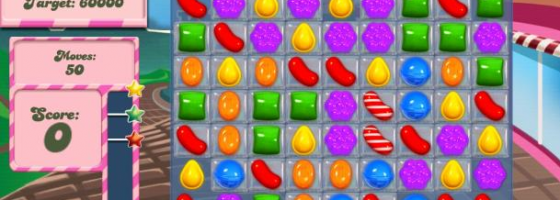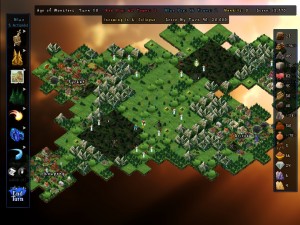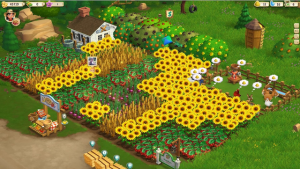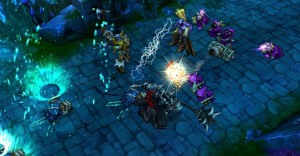Sustainable Game Design and the Casual Games Market Bust
The Casual Games Market has had a lot of problems lately and today's post highlights the fact that the current implementation is simply not sustainable for long term growth.

It seems like only yesterday that Zynga was dominating the casual games market. The absolute success of Farmville transformed Facebook into a casual game Mecca and it felt like every day we were hearing of a developer making a social/casual game.
Today the company is hemorrhaging money, massive layoffs and the new king in town (no pun intended) is King with Candy Crush Saga. But even with companies like King being the new casual game darling, something tells me the cycle is going to repeat again and it has to do with an unsustainable market.

Candy Crush Saga, originally posted on Cnet.com
Coming Back for More:
Sustainable game design is a term that I came up with that really lands more on the philosophical side of gameplay and the definition I have is this:
Sustainable Game Design: Developing a game with the purpose to provide continued benefit and enjoyment either with the singular game or with a series.
To put it another way, sustainable game design is about creating a game that is meant to engage users and have the developers profit from beyond the short term. Now that can mean two things depending on whether the game is single player or multiplayer focused.
For singleplayer, it means that the game is such an unique experience that you're not going to find 20 different clones of it on the market and the value is there in the fact that the gameplay makes you want to keep playing it. A great example would be the titles from Arcen Games and how each game is a unique property with design that can't be found anywhere else. This can also extend into sequels where you want to keep buying games in the series to either continue the story or get more of what you loved in the original.
With multiplayer it means a game that has enough content that it keeps you playing it with friends or random people for a long time. And either the game will be supported with new content to add longevity or more games in the series will expand and enhance the multiplayer so that fans will keep bouncing from one game to another (See Street Fighter or Call of Duty as examples.)
The point being that while developers and publishers are hoping for a quick success and profit on these titles, they still retain value either as individual games or complete series. We've talked about this with Nintendo on previous podcast discussions, Nintendo games retain their value for a very long time and it's rare to see a Nintendo game ever go below $20.

Skyward Collapse
Unique singleplayer titles retain their value by not being easily copied and remaining a great experience.The reason is that Nintendo's quality of game design has given their games immense value compared to other developers. There might be kart racers, action adventures and etc from other developers, but there is only one Mario Kart and one Zelda series.
Multiplayer games like Team Fortress and League of Legends have enough base content and an amazing core experience to get people invested and then continues to add new content and value to their games. However the casual games market with their focus on F2P and monetized games is not about creating a sustainable atmosphere.
Whale Hunting:
Most mobile and casual games are priced at 99 cents and lower, with gameplay that is repetitive or easily copied. Candy Crush Saga despite its popularity is still just another match 3 game in the same vein as Bejeweled. Their profit margin hinges on quick sales from whales that will get hook and spend their money before going on to the next craze. And the second the whales disappear and the game is no longer profitable, the developers pull the game and work on "the sequel/spinoff".
This type of slash and burn mentality is the same thing we saw happen in the arcade market from the 80s through 90s. Arcade games weren't meant to have long lasting value: You put your quarter in, play for a few minutes and you either play until you win or run out of money or reason to play. There was no persistence or value with arcade games beyond those few minutes of play. The same thing can be said of the gambling industry which their slot machines aren't meant to provide a long lasting experience, they're meant for quick engagement to get your money and then turn you loose for the next willing customer.
There are of course examples of games that try to elevate the mobile market such as Monument Valley but when they tried to earn money on their expansion DLC, fans turned on the developers calling them greedy. The problem is that the market that the mobile and social game companies have cultivated is one that wants quick engagements and largely don't follow specific developers.

Farmville 2, originally posted on Kotaku.com
Most casual/social games are meant for quick engagements designed to get as much money out of the consumer as possible.We've talked about this multiple times on the podcast and how the mobile market's focus on cheap pricing and quick engagement would be devastating if it became the norm for the PC market.
Many developers are having trouble making a profit when they have to sell their games at $10 or less and there is a consumer mindset today that $20 is pushing things for one game. Basically the casual market is built around only a few companies who hit it big like King staying afloat with the rest trying to make do with scraps.
Even though I've complained about F2P games, it's important to mention that not all F2P games are bad and that some are about providing value.
Free Value:
One consequence of the casual market having trouble with F2P games is that it has impacted F2P on the PC. With consumers educated and fed up with the tactics mobile developers use to get money, it makes it that much harder for PC developers to sell people on their F2P game.
Titles like Card Hunter, League of Legends and Hearthstone have immense value despite not requiring one cent to be spent. Money comes in either by consumers who want to support the game or those that want to speed up or enhance their experience.
This goes back to a Valve interview from a few years ago where they talked about the perception of value with Team Fortress and how different consumers valued money or time above the other. The best F2P games are those that provide options for both groups, not just with money.
Someone can enjoy playing the F2P games I mentioned above without spending money and the gameplay continues to work without it degrading unless they spend money. But the money option is there to either buy unique things like League of Legends skins or if someone values their time more and just wants to buy enough booster packs in Hearthstone to get some good cards out of it.

League of Legends, originally posted on PCgamer.com
Regardless of the F2P design, League of Legends was designed for long term value for its customers with fair monetization.The commonality between these three titles is that the developers are not focusing on whales but getting people over the long term.
The consumers who are going to become heavily invested in the game and want to continue seeing it grow with new content and add-ons. League of Legends has become a massive success with huge notoriety attached and Hearthstone has become one of the fastest growing competitive games I've seen since Starcraft.
And these titles are making huge amounts of money while retaining and growing their respective consumer bases.
The Dystopic Social Market:
At the recent Casual Connect Europe Conference, speaker Thorsten Rauser called out the casual games market and said that the casual game industry “was a joke" due to how exploitative it has become and he has a good point.
We have had this conversation on the Game-Wisdom Podcasts about the mobile market and that it shows the largest signs of heading towards a bust. Most casual game designers aren't interested in creating a fan base and sustainable market, but something designed to take as much money before disappearing and while that is great for the short term, it can't last.
To end this post I have one question for everyone reading this to highlight the casual games market problem. We all know some of the most influential games in the industry: Mario, X-Com, World of Warcraft and so on whose impact and memory will last for a long time. Tell me, how many of you think that we'll still remember or even care about Candy Crush Saga, Farmville or Flappy Bird in 10 years?
( For more posts on game design and the industry, weekly podcasts and livestream events, check out Game-Wisdom)
Read more about:
BlogsAbout the Author(s)
You May Also Like







.jpeg?width=700&auto=webp&quality=80&disable=upscale)








